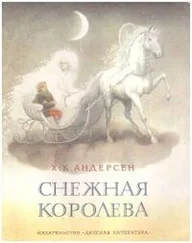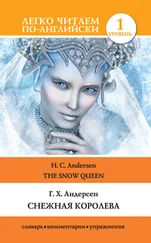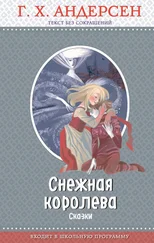| Hans Christian Andersen |
Ганс Христиан Андерсен |
| The Snow Queen |
Снежная королева |
| Story the First, Which Describes a Looking-Glass and the Broken Fragments. |
Рассказ первый ЗЕРКАЛО И ЕГО ОСКОЛКИ |
| You must attend to the commencement of this story, for when we get to the end we shall know more than we do now about a very wicked hobgoblin; he was one of the very worst, for he was a real demon. |
Ну, начнем! Дойдя до конца нашей истории, мы будем знать больше, чем теперь. Так вот, жил-был тролль, злющий-презлющий; то был сам дьявол. |
| One day, when he was in a merry mood, he made a looking-glass which had the power of making everything good or beautiful that was reflected in it almost shrink to nothing, while everything that was worthless and bad looked increased in size and worse than ever. |
Раз он был в особенно хорошем расположении духа: он смастерил такое зеркало, в котором все доброе и прекрасное уменьшалось донельзя, все же негодное и безобразное, напротив, выступало еще ярче, казалось еще хуже. |
| The most lovely landscapes appeared like boiled spinach, and the people became hideous, and looked as if they stood on their heads and had no bodies. |
Прелестнейшие ландшафты выглядели в нем вареным шпинатом, а лучшие из людей - уродами, или казалось, что они стоят кверху ногами, а животов у них вовсе нет! |
| Their countenances were so distorted that no one could recognize them, and even one freckle on the face appeared to spread over the whole of the nose and mouth. |
Лица искажались до того, что нельзя было и узнать их; случись же у кого на лице веснушка или родинка, она расплывалась во все лицо. |
| The demon said this was very amusing. |
Дьявола все это ужасно потешало. |
| When a good or pious thought passed through the mind of any one it was misrepresented in the glass; and then how the demon laughed at his cunning invention. |
Добрая, благочестивая человеческая мысль отражалась в зеркале невообразимой гримасой, так что тролль не мог не хохотать, радуясь своей выдумке. |
| All who went to the demon's school-for he kept a school-talked everywhere of the wonders they had seen, and declared that people could now, for the first time, see what the world and mankind were really like. |
Все ученики тролля - у него была своя школа- рассказывали о зеркале, как о каком-то чуде.- Теперь только, - говорили они, - можно увидеть весь мир и людей в их настоящем свете! |
| They carried the glass about everywhere, till at last there was not a land nor a people who had not been looked at through this distorted mirror. |
И вот они бегали с зеркалом повсюду; скоро не осталось ни одной страны, ни одного человека, которые бы не отразились в нем в искаженном виде. |
| They wanted even to fly with it up to heaven to see the angels, but the higher they flew the more slippery the glass became, and they could scarcely hold it, till at last it slipped from their hands, fell to the earth, and was broken into millions of pieces. |
Напоследок захотелось им добраться и до неба, чтобы посмеяться над ангелами и самим творцом. Чем выше поднимались они, тем сильнее кривлялось и корчилось зеркало от гримас; они еле-еле удерживали его в руках. |
| But now the looking-glass caused more unhappiness than ever, for some of the fragments were not so large as a grain of sand, and they flew about the world into every country. |
Но вот они поднялись еще, и вдруг зеркало так перекосило, что оно вырвалось у них из рук, полетело на землю и разбилось вдребезги. Миллионы, биллионы его осколков наделали, однако, еще больше бед, чем самое зеркало. |
| When one of these tiny atoms flew into a person's eye, it stuck there unknown to him, and from that moment he saw everything through a distorted medium, or could see only the worst side of what he looked at, for even the smallest fragment retained the same power which had belonged to the whole mirror. |
Некоторые из них были не больше песчинки, разлетелись по белу свету, попадали, случалось, людям в глаза и так там и оставались. Человек же с таким осколком в глазу начинал видеть все навыворот или замечать в каждой вещи одни лишь дурные стороны, - ведь каждый осколок сохранял свойство, которым отличалось самое зеркало. |
| Some few persons even got a fragment of the looking-glass in their hearts, and this was very terrible, for their hearts became cold like a lump of ice. |
Некоторым людям осколки попадали прямо в сердце, и это было хуже всего: сердце превращалось в кусок льда. |
| A few of the pieces were so large that they could be used as window-panes; it would have been a sad thing to look at our friends through them. |
Были между этими осколками и большие, такие, что их можно было вставить в оконные рамы, но уж в эти окна не стоило смотреть на своих добрых друзей. |
| Other pieces were made into spectacles; this was dreadful for those who wore them, for they could see nothing either rightly or justly. |
Наконец, были и такие осколки, которые пошли на очки, только беда была, если люди надевали их с целью смотреть на вещи и судить о них вернее! |
| At all this the wicked demon laughed till his sides shook-it tickled him so to see the mischief he had done. |
А злой тролль хохотал до колик, так приятно щекотал его успех этой выдумки. |
| There were still a number of these little fragments of glass floating about in the air, and now you shall hear what happened with one of them. |
Но по свету летало еще много осколков зеркала. Послушаем же про них. |
| Second Story: A Little Boy and a Little Girl |
Рассказ второй МАЛЬЧИК И ДЕВОЧКА |
| In a large town, full of houses and people, there is not room for everybody to have even a little garden, therefore they are obliged to be satisfied with a few flowers in flower-pots. In one of these large towns lived two poor children who had a garden something larger and better than a few flower-pots. |

![Агата Кристи - На краю [английский и русский параллельные тексты]](/books/32247/agata-kristi-na-krayu-anglijskij-i-russkij-paralle-thumb.webp)
![Агата Кристи - Объявлено убийство [английский и русский параллельные тексты]](/books/33247/agata-kristi-obyavleno-ubijstvo-anglijskij-i-russ-thumb.webp)
![Фрэнсис Фицджеральд - По эту сторону рая [английский и русский параллельные тексты]](/books/34130/frensis-ficdzherald-po-etu-storonu-raya-anglijskij-thumb.webp)
![Роберт Шекли - Компания «Необузданные таланты» [английский и русский параллельные тексты]](/books/34808/robert-shekli-kompaniya-neobuzdannye-talanty-angl-thumb.webp)


